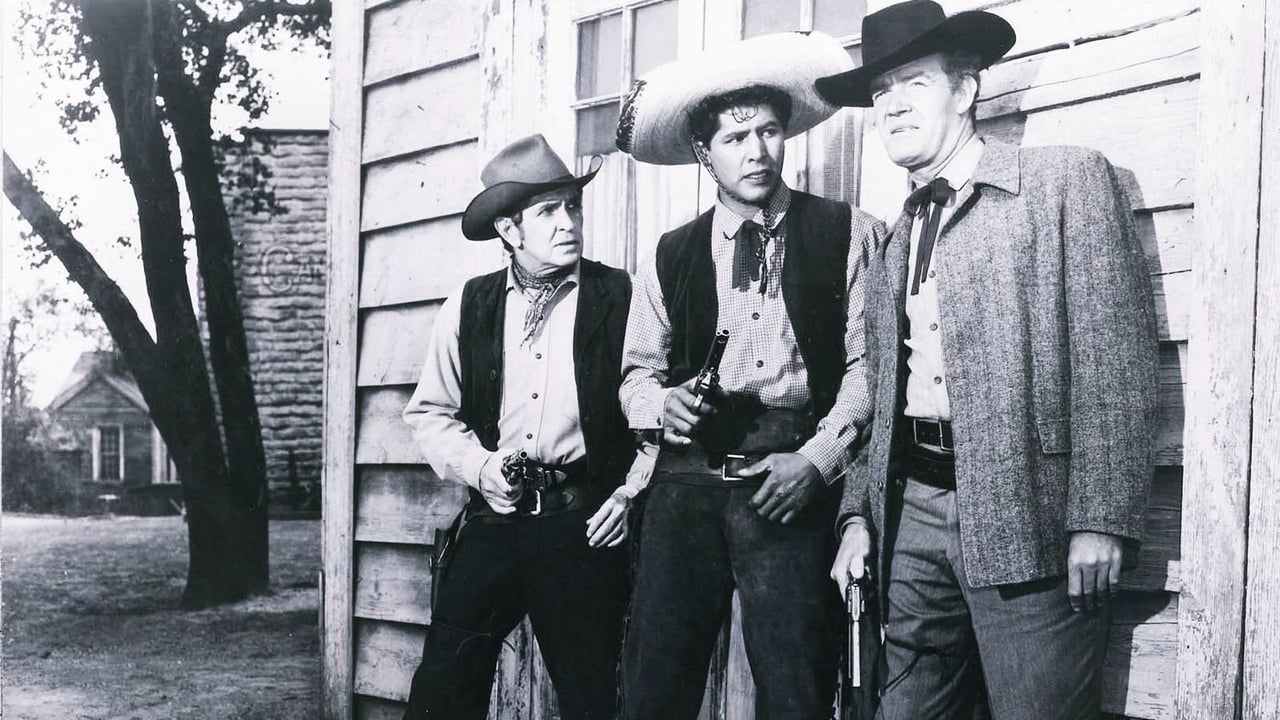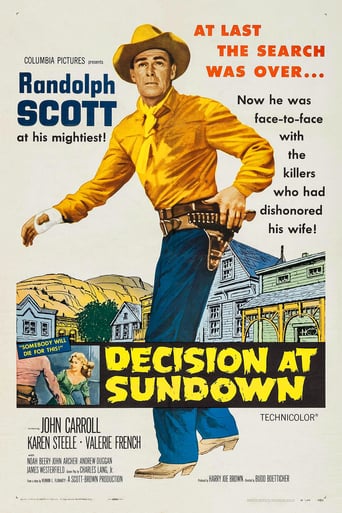



Must See Movie...
Ok... Let's be honest. It cannot be the best movie but is quite enjoyable. The movie has the potential to develop a great plot for future movies
View MoreThis is a gorgeous movie made by a gorgeous spirit.
View MoreI enjoyed watching this film and would recommend other to give it a try , (as I am) but this movie, although enjoyable to watch due to the better than average acting fails to add anything new to its storyline that is all too familiar to these types of movies.
View MoreIn my opinion this is the film that Scott should not have done. The script is bad. Scott lives a husband who was betrayed by his wife years ago and seeks revenge the man responsible for it. The film escapes the traditional western line where the hero always has some dignity. Scott's character is a disoriented. Into the church in a way completely meaningless and then hides in a warehouse, taking his friend to death. Their actions do not make sense, despite being shown in history as having changed the lives of everyone in the community. All characters are caricatured, it does not seem that may exist. "Decision at Sundown" does not have the same strength of other Boetticher films and finishes disconcertingly again with Scott disoriented and drunk. I'm sorry those who admire the film, but I consider him very weak. Disappointing.
View MoreIn more recent years, the revisionist Western made heroes out of outlaws and men out for revenge. Think of Clint Eastwood's Will Munny in "Unforgiven". At the same time, Gene Hackman's Little Bill Daggett in the same picture was the epitome of the evil town boss, taking gleeful pleasure in dispatching anyone who threatened his supremacy. You can replace the town of Big Whiskey with the titled town of this picture, but the protagonists here don't quite build the kind of tension one expects on the way to a final showdown. Bart Allison's (Randolph Scott) motivation is built on the false premise that a villain stole his wife away from him, and refuses to acknowledge that she was in fact a 'loose' woman. The town-folk of Sundown are presented as intermediaries in this fable, who have trouble acknowledging that Tate Kimbrough (John Carroll) is the bad guy he's supposed to be, or at least as bad as Allison's preconceived notion insists on.Since I brought Eastwood's name into it, I might as well get another thought off my chest. I like Randolph Scott, but casting him as a sixty year old gunfighter doesn't quite work in the final analysis. Catch him hunched over the bar looking like hell after the film's high spot and you'll see what I mean. Though he did age better than John Wayne and kept himself in generally good shape. I'm trying to visualize him fifty pounds overweight wearing an eye-patch and it's not a pretty picture.I've read any number of reviews regarding Scott's collaboration with director Budd Boetticher, but I haven't experienced the magic yet. I'd rate the two I've seen so far, "Comanche Station" and "Ride the High Country" as somewhat better, primarily because Scott's character comes off as a more principled and heroic figure in those films. In this one, it's the villain who rides off into the sunset with the girl, leaving the conflicted gunman behind to tend to his wounds and trying to figure out where it all went wrong.
View MoreThis 3rd film in the Boetticher/Scott series shows a marked departure from the first two films, evidenced almost at once when an unshaven Scott as Bart Allison, a passenger in a stagecoach, orders it to halt at gunpoint. Is he a bandit or a murderer? Well, no, that would be too much, but he is a desperate man not interested in working inside or with the law, a route he follows for the whole film. After a tense couple of moments, the stagecoach halts but instead of robbing or gun-play, Allison merely allows it to ride off as he is met by his companion Sam (Noah Beery Jr) with two horses. Sam tells Bart that the man he seeks, Tate Kimbrough, is in Sundown a few miles away, and the two ride grimly off.Kimbrough it turns out is the big cheese in Sundown and is about to marry Lucy (Karen Steele), the daughter of Mr. Summerton (John Litel) the other bigwig in town -- though it seems that he has only recently torn off from a relationship with Ruby, a woman he's left in the dust for greater rewards, though she clearly loves him. And Allison is here to kill him. As in The Tall T there are a few minutes of nice character development and "business" as Allison gets a shave and he and Sam have a couple of drinks in the saloon, Sam whining about his hunger and Allison defaming Kimbrough to everybody whether they want to hear it or not - though in characteristic Randolph Scott fashion, he waits for his opportunities and keeps his insults terse. There's some nice subtle development of the town's attitude here - at first it seems that everybody is happy for Tate and Lucy, but by the time Allison goes to disrupt the wedding at the church it's become clear that the townsfolk fear Kimbrough and respect his power, nothing more. Allison by this time has already shown that his vengeance takes precedence over everything else and after making threats at the wedding he manages to get Sam and himself trapped inside a livery stable where they remain for most of the rest of the film. Slowly we learn little bit of Allison's past and his hatred, but it never becomes clear that Kimbrough did anything worth killing; perhaps he had an affair with Mary, Allison's dead wife -- and perhaps she died as a result -- but it is clear that his hatred has driven Allison to the verge of insanity. Kimbrough tries to buy him off...others try to reason with him...to no avail. Meanwhile the townspeople have gotten restless as they see that Kimbrough's bought-and-paid for sheriff, Swede (Jim Duggan) and his deputies aren't doing much of anything to ease the situation. Egged on by free whiskey (courtesy of Kimbrough) they start to make their true feelings heard, especially after Sam, who has left Allison but goes back to try to reason with him, is shot in the back by Swede and his deputy Spanish. They rally and let Kimbrough and the sheriff know they've had enough, and force the sheriff to meet a now even more vengeful Allison one to one.Sheriff faced and dispatched, there's only Kimbrough -- but Kimbrough's true love Ruby won't let him be gunned down, and neither she nor the doctor will allow Allison to continue his madness without hearing the truth about his wife - that she was a tramp, that Kimbrough wasn't the first man to cuckold him, and that she died by her own hand, sick of herself and the world. Finally Allison is disabused of his quest, and the film ends with Kimbrough and Lucy leaving town, to start over hopefully wiser and stronger --- and Allison leaving too, after drowning his sorrow at the loss of Sam, his only real link to humanity, and leaving also, broken and bitter.This finish is quite extraordinary - there is no final gunfight, the "bad guy" Kimbrough turns out not to be the bad guy that the hero thought he was (but much worse in some respects - except Allison doesn't care about that) and goes away having lost his power and influence but gained some self-knowledge; and Randolph Scott's good guy is found wanting and chastened himself, having lived a lie for years and not really understanding how to deal with it. It's this ending that really resonates and elevates the film to a fairly high caliber, though it doesn't entirely make up for the faults in Charles Lang's screenplay, which include a too-Hollywood and corny speech by the doctor rallying the town (along with several earlier bits of flat and "movie" dialog), a somewhat larger cast and corresponding weak characterizations for some of the more important secondary characters, and most importantly perhaps a rather unbelievable and very unlikable hero -- in the other Scott westerns his characters' deficiencies are more made up for by a juicier and more interesting supporting cast; here nearly everyone is unpleasant, which makes the doctor's speech and a few lines from the bartender resonate all the more - but doesn't make it any easier for us to care for our "hero." In the end, it is the doctor and the two women who are the moral centers of the film, but none of them has enough time or development, and the film seems quite cynical and bleak, beyond its intentions I think.So all in all, not quite up to the level of the first two, but quite enjoyable and exciting overall, with a lot of fascinating stuff to say about the dangers of obsession, and also the worthlessness of a greed that allows a town to be cowed by its richest man despite hating him all the while. I suppose some could read this as a metaphor about the Red scare; I wouldn't go that far, but it does give one something to chew on.
View MoreBart Allison and Sam, his trusty companion, ride into Sundown looking for a guy named Tate Kimbrough. It appears that Kimbrough had a dalliance with Allison's wife some years earlier, an affair that led to the suicide of the erstwhile Mrs Allison. With revenge and hatred eating away at him, Allison will not rest until he gets his man, but his very being here in Sundown will be the catalyst for not only himself, but also every other resident of this dusky town.Randolph Scott {Bart Allison} and director Budd Boetticher made seven very interesting, and intelligent Westerns together, each man seemingly using each one as a muse of sorts. This particular entry on their wonderful resume's is a fine testament to their winning formula, because Decision At Sundown offers up something different outside of your standard Western fare. The plot structure is for sure very basic, the man out for revenge, and the town in the grip of less than honourable men, but here our main protagonist really isn't thinking with his head. He is driven by rage and an affair of the heart, he in fact doesn't care if he lives or dies, just as long as he gets his man!. Also of interest is the effect on the town of Sundown that Allison has, it certainly lent me to think about some so called supernatural Westerns that would surface later on down the line, whilst the ending here doesn't resort to any sort of cop out formula's, it's poignant and begs for a further train of thought.Scott is first rate as Allison, grey hair personifying the wisdom that he has lost due to his blind thirst for revenge, with a devilment glint evident in both of his eyes. Scott does an excellent line in rage and grief stricken acting, so no doubt in my mind that Randy Scott was a wonderful actor in this splendid of Western genres. Backing Scott up is Noah Beery Jr {Sam} and John Archer as Dr. John Storrow, but of the rest of the cast I personally couldn't lend too much praise for, with the main negative of note being that the villains of the piece barely get out of grumpy only territory, John Carroll {Kimbrough} and Andrew Duggan as crooked Sheriff Swede Hansen really should have gone for a more twirling moustache type villainy than the underplayed ones we actually get.But underplayed villains be damned, this is still a hugely enjoyable picture, and one that definitely holds up on a repeat viewing. 7/10
View More